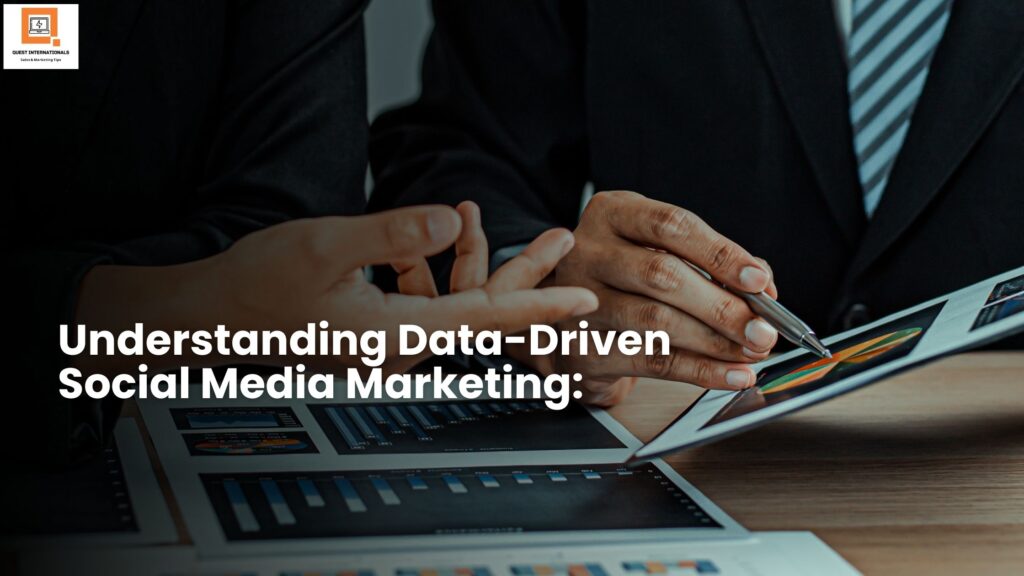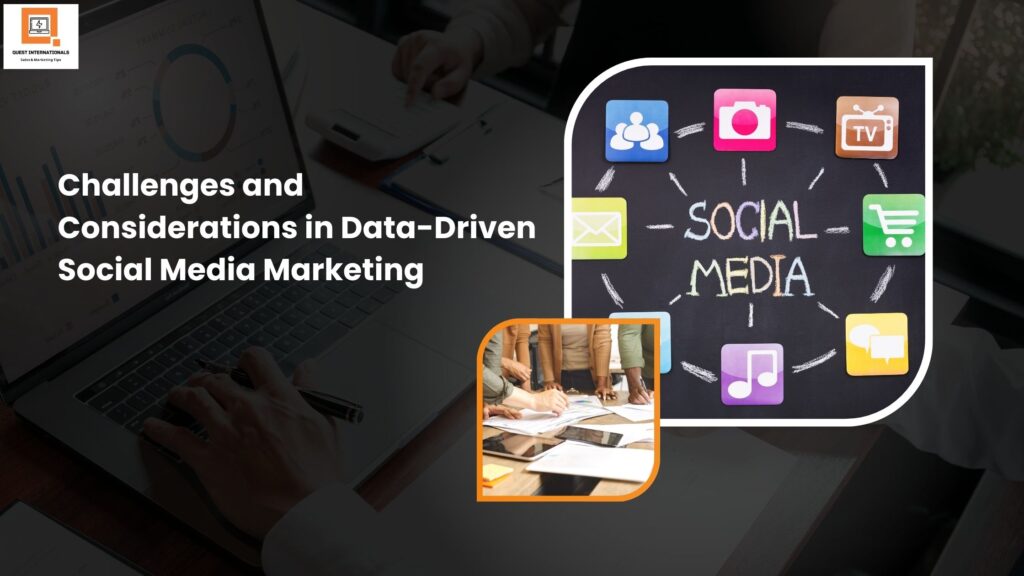Data-driven social media marketing has become a potent instrument for reaching audiences, increasing brand recognition, and achieving corporate goals.
In the constantly changing world of digital advertising, businesses are searching for creative ways to improve their online visibility and drive expansion.
Businesses are relying on data-driven strategies to optimize the impact of social media initiatives, using analytics to guide and improve their marketing plans.
We’ll go into data-driven social media marketing in the following blog post, looking at how analytics may be used to strengthen business efficiency.
Understanding Data-Driven Social Media Marketing:

Data-driven social media marketing involves the collection, analysis, and interpretation of data to make informed decisions about social media strategies. Instead of relying solely on intuition or guesswork, businesses use analytics tools to gain insights into user behavior, engagement metrics, and overall campaign performance.
This data-driven approach enables marketers to tailor their strategies based on concrete evidence, resulting in more targeted and effective social media campaigns.
Analytics’s Significance in Social Media Marketing
Analytics plays a pivotal role in social media marketing by providing valuable information at every stage of the marketing funnel. Let’s explore how analytics can be applied to various aspects of social media marketing:
- Audience Insights: Businesses may better understand their audience with the use of analytics technologies. Demographic data, interests, and online behavior can be analyzed to create detailed buyer personas. This information helps in crafting content that resonates with the target audience, ultimately driving engagement and conversions.
- Content Optimization: By tracking the performance of social media content, marketers can identify what works and what doesn’t. Analytics reveal which types of posts, visuals, and messaging resonate most with the audience. This insight can guide the creation of more compelling and shareable content, leading to increased brand visibility.
- Campaign Performance: Social media campaigns can be meticulously monitored using analytics tools. Marketers can track key performance indicators (KPIs) such as reach, engagement, click-through rates, and conversions. This data allows for real-time adjustments, ensuring that campaigns are optimized for maximum impact.
- Competitor Analysis: Analytics not only provide insights into a brand’s performance but also allow for a comprehensive analysis of competitors. Understanding how competitors engage with their audience, the effectiveness of their campaigns, and the surrounding their brand helps in identifying opportunities and refining strategy.
- ROI Measurement: Businesses invest considerable resources in social media marketing, and it’s crucial to measure the return on investment. Analytics tools enable the tracking of conversions and attributing them to specific campaigns, providing a clear picture of the monetary value generated through social media efforts.
Implementing Data-Driven Social Media Marketing:
Now that we’ve highlighted the importance of analytics in social media marketing, let’s explore the steps businesses can take to implement a data-driven approach effectively:
- Define Clear Objectives: Before diving into analytics, it’s essential to establish clear objectives for your social media marketing efforts. Whether it’s increasing brand awareness, driving website traffic, or boosting sales, having specific and measurable goals will guide the data collection and analysis process.
- Choose Relevant Metrics: Not all metrics are created equal, and businesses should focus on those that align with their objectives. For example, if the goal is brand awareness, metrics like reach and impressions may be more relevant, while conversion-focused campaigns may prioritize click-through rates and conversion rates.
- Select the Right Analytics Tools: There is a myriad of analytics tools available, ranging from platform-specific insights to comprehensive social media management tools. Choose tools that align with your business goals and provide the data necessary to measure performance effectively. Popular choices include Google Analytics, Facebook Insights, and Hootsuite Analytics.
- Regularly Monitor and Analyze Data: Data-driven marketing is an ongoing process. Regularly monitor the performance of your social media efforts, and analyze the data to identify trends, patterns, and areas for improvement. Set aside time for in-depth reviews of your analytics reports to inform future strategies.
- A/B Testing: Experimentation is a key component of data-driven marketing. Conduct A/B tests to compare different elements of your campaigns, such as ad copy, visuals, or posting times. Analyzing the results of these tests provides insights into what resonates most with your audience and informs optimization strategies.
- Integrate Data Across Channels: Many businesses utilize multiple social media platforms. Integrating data across these channels provides a holistic view of your social media performance. This cross-channel analysis helps identify overarching trends and ensures a unified approach to social media marketing.
Challenges and Considerations in Data-Driven Social Media Marketing:

While the benefits of data-driven social media marketing are evident, it’s crucial to acknowledge the challenges and considerations associated with implementing such strategies.
- Data Privacy and Compliance: As data becomes a cornerstone of marketing strategies, ensuring compliance with data protection regulations is paramount. Marketers must be diligent in handling user data responsibly and transparently to maintain trust with their audience and avoid legal implications.
- Data Accuracy and Quality: The success of data-driven marketing hinges on the accuracy and quality of the data collected. Decisions and insights might be redirected as a result of insufficient or inaccurate data. Regularly audit and validate your data sources to ensure the reliability of the information used in your analytics.
- Interpreting Complex Data Sets: Analytics tools often provide a wealth of data, and interpreting complex data sets can be challenging. Businesses should invest in training for their marketing teams to enhance their ability to derive meaningful insights and translate them into actionable strategies.
- Balancing Quantitative and Qualitative Insights: While quantitative data is essential for measuring performance, qualitative insights provide context and a deeper understanding of audience sentiment. Striking the right balance between quantitative and qualitative data is key to crafting a comprehensive social media strategy.
Future Trends in Data-Driven Social Media Marketing:
As technology continues to advance, several trends are shaping the future of data-driven social media marketing:
- Artificial Intelligence (AI) and Machine Learning (ML): AI and ML are revolutionizing social media analytics. These technologies can analyze vast amounts of data, predict trends, and automate decision-making processes. AI-driven insights can provide a competitive edge by enabling marketers to stay ahead of evolving consumer behaviors.
- Predictive Analytics: Predictive analytics uses historical data and machine learning algorithms to forecast future trends. In social media marketing, this can help businesses’ audience behavior, optimize content strategies, and make proactive adjustments to their campaigns.
- Augmented Reality and Virtual Reality: The integration of AR and VR in social media is creating immersive experiences for users. Marketers can use data from these experiences to understand user preferences and tailor future campaigns for maximum impact.
- Social Listening and Sentiment Analysis: Social listening tools analyze online conversations to understand what people are saying about a brand. Combining sentiment analysis with social listening provides insights into audience opinions and emotions, helping businesses proactively manage their online reputation.
Conclusion:
The era of data-driven social media marketing has arrived, and businesses that use the power of analytics are positioned for success in the digital landscape.
By leveraging data to understand their audience, optimize content, and measure performance, companies can create targeted and impactful social media campaigns.
The journey towards effective data-driven social media marketing involves defining clear objectives, choosing relevant metrics, and implementing the right analytics tools.
As technology evolves, future trends such as AI, predictive analytics, and immersive experiences will further shape the landscape, offering new opportunities for innovative and impactful social media strategies.
In a world where digital connections are integral to business success, embracing data-driven social media marketing isn’t just a choice; it’s a necessity. By doing so, businesses can not only enhance their online presence but also drive overall business performance in an increasingly interconnected and data-driven global marketplace.




